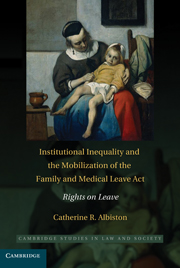Book contents
- Frontmatter
- Contents
- Preface
- Acknowledgments
- 1 Institutions, Inequality, and the Mobilization of Rights
- 2 The Social Institution of Work
- 3 Institutional Inequality and Legal Reform
- 4 Mobilizing the FMLA in the Workplace: Rights, Institutions, and Social Meaning
- 5 Mobilizing Rights in the Courts: The Paradox of Losing by Winning
- Conclusion
- Appendix A
- Appendix B
- References
- Index
- Cambridge Cultural Social Studies
1 - Institutions, Inequality, and the Mobilization of Rights
Published online by Cambridge University Press: 05 October 2010
- Frontmatter
- Contents
- Preface
- Acknowledgments
- 1 Institutions, Inequality, and the Mobilization of Rights
- 2 The Social Institution of Work
- 3 Institutional Inequality and Legal Reform
- 4 Mobilizing the FMLA in the Workplace: Rights, Institutions, and Social Meaning
- 5 Mobilizing Rights in the Courts: The Paradox of Losing by Winning
- Conclusion
- Appendix A
- Appendix B
- References
- Index
- Cambridge Cultural Social Studies
Summary
FOR THE PAST ONE-HALF CENTURY, INEQUALITY IN EMPLOYMENT has been addressed through antidiscrimination laws that prohibit discrimination on the basis of certain protected categories. These statutes conceive of inequality as the product of individual animus toward traditionally subordinated groups, including those defined by race, gender, and disability. Individual animus is clearly unacceptable, and workplace policies or rules that disproportionately disadvantage workers within a protected class are subject to challenge in some limited circumstances. Courts have also allowed challenges to workplace practices such as subjective decision making that allow animus to operate freely. Institutions, however, are at most marginal concerns for these statutes. In evaluating claims of discrimination, courts examine actions and rules within specific workplaces on a case-by-case basis; they do not consider the industry-wide practices, such as time norms, attendance requirements, or workplace schedules, which largely define work in our culture. Until recently, basic institutional arrangements that make up what we understand to be work have been largely insulated from any meaningful substantive legal reform.
A few laws enacted toward the end of the twentieth-century attempt to address work institutions directly. For example, the Americans with Disabilities Act (ADA) requires workplaces to provide reasonable accommodations to workers with disabilities, including changes to workplace structures and practices. The Family and Medical Leave Act (FMLA), which is the subject of this study, requires specific modifications of time standards and the schedule of work to allow workers time off for their own illnesses, to care for ill or injured family members, for pregnancy and childbirth, or to care for a new child in the family.
- Type
- Chapter
- Information
- Institutional Inequality and the Mobilization of the Family and Medical Leave ActRights on Leave, pp. 1 - 24Publisher: Cambridge University PressPrint publication year: 2010

